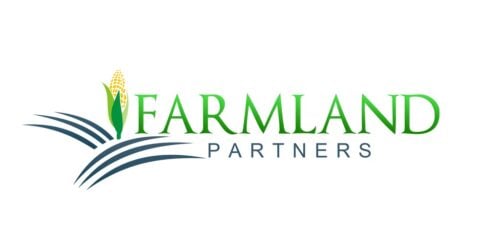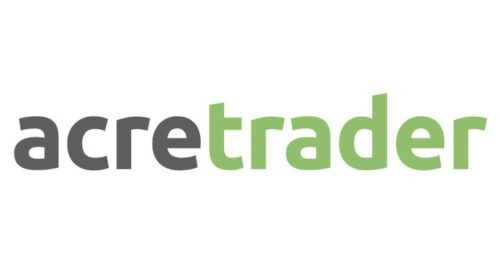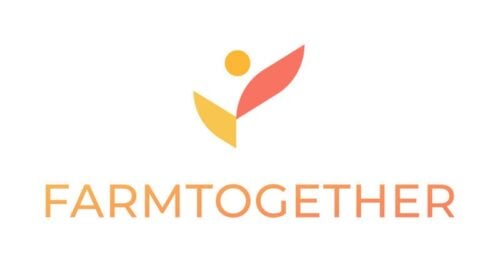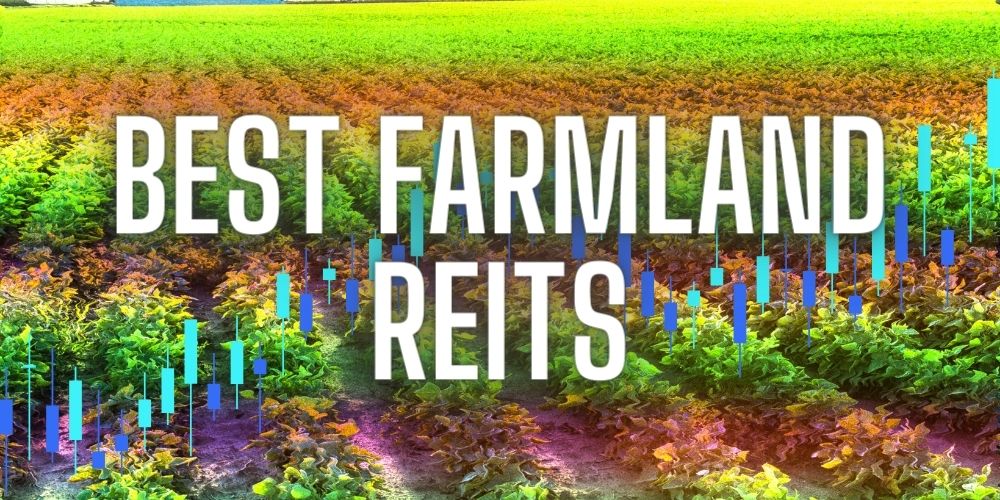A storm is brewing for farmers as inflationary pressures coupled with a steep loss of farmland push land prices upwards. Investors looking to hedge against inflation may consider farmland REITs as a way to protect their capital and earn additional income. That said, what are the best farmland REITs to buy right now? Let’s find out.
Best Farmland REITs
Gladstone Land Corporation (NASDAQ: LAND)
Gladstone Land Corporation was formed in 1997 and holds the prestigious title of being the first-ever farmland REIT to be traded in the stock market.
LAND follows a traditional equity REIT model, generating income by leasing farmland out to farmers.
Its primary focus is growing healthy foods such as fruits, vegetables, and nuts. But Gladstone Land Corp has grown more than just produce; it has significantly grown in value.
Since its inception, the farmland REIT holdings have expanded to 169 farms. The properties cover over 115,000 acres of agricultural land and 45,000 acre-feet of banked water.
This enormous growth has swelled its market cap to a jaw-dropping $734 million, with assets amounting to $1.5 billion in value.

Gladstone Land has had an exceptional quarter, reporting better-than-expected financial results for Q3 2022. The REIT announced a 19.3% hike in total operating revenues and a 60% hike in AFFO.
Management pointed out that growth was primarily driven by acquisitions — asking investors to exercise caution as the trend may slow down over the next quarters.
The remarkable earnings are backed by an impressive occupancy rate, as 100% of its farms are under a lease agreement.
Since its initial public offering (IPO) in 2013, Gladstone Land has paid 114 consecutive monthly cash distributions to investors. The farmland REIT pays dividends monthly, which is a great option for investors looking for recurring monthly income. Gladstone Land’s current annual dividend yield rate is 2.6%.
Its stock valuation has taken a hit along with the rest of the stock market. The farmland REIT is down nearly 50% from its all-time highs, much more than the S&P during the same period.
Despite its earnings performance and the lowered valuation, analysts still argue that it may be overpriced at a 29 P/E ratio.
Related: These Are The 9 Best High Yield REITs For Income To Buy Right Now!
Farmland Partners Inc (NYSE: FPI)
Farmland Partners was the second farmland REIT to enter the public markets.
Until recently, Farmland Partners held second place as the largest farmland REIT, right behind Gladstone Land Corporation. However, Farmland Partners’ $750 million market cap now tops the list with a slight advantage.
Farmland Partner’s leadership doesn’t end there; it has also surpassed LAND in acreage. FPI operates over 190,000 acres of agricultural land, making it the largest farmland REIT in the United States.
Its 340+ farms produce roughly 26 different kinds of agricultural commodities, providing investors with a diversified portfolio of crops.

Farmland Partners strongly focuses on green energy and prioritizes ESG scores, making it an excellent choice for environmentally conscious investors.
FPI owns and operates five solar and three wind energy projects.
When added together, Farmland Partners’ energy projects output over 110 megawatts of power. As energy prices soar across the globe, diversifying into energy could be both a smart and profitable strategy.
Unlike its counterpart, Farmland Partners has held its stock price relatively well during the recent stock market downturn.
The farmland REIT is down a mere 16% from its all-time high and has maintained a steady uptrend since its 2019 bottom.
But its stock price may not fully reflect its current value as P/E remains considerably high at 72x.
Investors looking to add Farmland Partners to their portfolio could expect to be paid a dividend yield of 1.75% quarterly.
Related: The 8 Best Green Energy Penny Stocks To Buy Now
Farmland REITs Alternatives
Aside from farmland REITs, there aren’t many other options in the stock market to invest in farmland.
Currently, there are only two Farmland REITs being traded in US exchanges.
But that doesn’t have to stop investors from further diversifying into this sector. There are farmland investment options available outside the traditional equity REIT model.
A popular alternative to accessing farmland investments is using farmland crowdfunding platforms.
Crowdfunding platforms offer investors farmland as fractional shares and returns when crops are sold.
Unlike REITs, crowdfunding platforms tend to give exposure to a single farm real estate investment rather than a basket of them.
Some examples of farmland crowd-funding platforms include:
FarmFundr
FarmFundr is a farmland crowdfunding platform focusing on the growth of specialty crops across the United States.
The platform offers investors fractional ownership by selling them shares from an LLC that owns the property.
The platform’s legal structure protects investors from liabilities that may come from owning farmland.
This model allows investors to amass capital gains on agricultural real estate without funding the entire project.

Investing in FarmFundr doesn’t come cheap, as a minimum investment of $10,000 to $100,000 is required by investors. A much larger capital commitment than that of a farmland REIT, which only requires purchasing one share.
Passive income from FarmFundr doesn’t work in the same way as farmland REITs do.
Instead of paying investors a dividend, FarmFundr distributes annual returns generated from sales of the crop harvest. This comes in addition to the capital appreciation of the land.
FarmFundr is owned and operated by a 4th-generation farmer with a proven farmland investment track record.
AcreTrader
Investors can use AcreTrader to invest in agricultural real estate by purchasing shares in entities that own farmland. It operates as a fractional share investment, similar to FarmFundr.
Each share and investor purchase equals 1/10 of an acre of farmland in a farm of their choice. Similar to FarmFundr, investors will receive an equal share of the farm income after all the crops are sold.
The platform usually asks for a minimum investment of 10 shares, ranging in value from $3,000 to $10,000.

Investors who no longer want to participate may be able to list their shares in the AceTrader marketplace for other investors to bid on.
The company’s website claims that investors generally see an average annual investment return of 11%, providing investors with a 100% return on investment in less than ten years.
Related: AcreTrader Review: The Easiest Way to Invest in Farmland?
Harvest Returns
Harvest Farms offers qualified investors a variety of carefully screened private farmland investments.
The platform has raised over $27 million to fund 43 farms, returning investors over $6 million back in profits.

Investments commence at $5,000, and the platform conveniently offers retirement account investment options.
The fund is partnered with select IRA companies that allow transferring or rollover of IRA or 401K funds without a tax penalty.
FarmTogether
This platform offers an enticing target rate of returns to investors of up to 13% with a target net cash yield of up to 9%.
Since its inception in 2017, the fund has been able to finance 35 farmland properties worth over $160 million.
FarmTogether provides assurances to investors through its certified accreditation and annual audits.

The fund is a member of NCREFI, a leading provider of investment performance indices and transparent data for US commercial properties.
The farm’s acreage is also certified annually through the Leading Harvest Sustainability Standard. The standard verifies that farmland is being managed sustainably through third-party audits.
Auditing and accreditation provide investors with peace of mind and build trust.
Related: FarmTogether Review: The Best Way To Invest In Farmland?
Are Farmland REITs a Good Investment?
Investors looking to hedge against inflationary pressures could find farmland REITs to be a good investment vehicle.
Agricultural investing has proven to be a consistent and stable yield, making it an excellent inflation hedge. However, investing directly in farmland can cost a lot and require specialized knowledge in farm operations.
Investing in farmland REITs may be a way to circumvent the hurdles of farm ownership. Farmland REITs offer land appreciation and dividend income without the need to fully own or operate a farm.
REITs also diversify portfolios among different crops and farms, providing added investment safety.
Crowdfunding platforms can also offer investors a similar exposure to that of farmland REITs; however, it lacks land diversification which may increase the risk of the investment.
For example, the exposure to multiple farms offered by a REIT may help protect investors against the downfalls of natural disasters.
Inflationary pressures, a decrease in US farmland, and an increasing global population are all driving value in the sector.
The war in Ukraine has also affected the global grain market, raising awareness about the need to grow more produce internally. Further developments in the war could drive farmland prices higher.
A decrease in farmland acreage could also be a driver for value. Acreage in the United States is decreasing at a rate of 2 million acres per year.
Related: How Farmland Makes For A Well-Diversified Portfolio
Final Words
Farmland has the potential to appreciate in value as the need to produce more food rises.
By buying farmland REITs, investors could easily and cheaply gain exposure to the sector.
Now that you know more about Farmland REITs, you may consider adding one (or more) to your portfolio.
You might also like:
These Are The 10 Best Residential And Apartment REITs To Buy For Income!
The 8 Best Mortgage REITs To Buy Right Now!


 Tags:
Tags:










